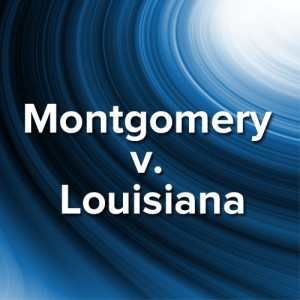Montgomery v. Louisiana: Juvenile Sentencing Decision Is Retroactive

In Montgomery v. Louisiana, 577 U. S. ____ (2016), the U.S. Supreme Court addressed how state courts should apply its decision in Miller v. Alabama, in which the Court held that the Eighth Amendment prohibits a sentencing scheme that requires life in prison without the possibility of parole for juvenile homicide offenders.
Montgomery v. Louisiana Miller v. Alabama By a vote of 6-3, the justices held that the Court had jurisdiction to decide whether the Supreme Court of Louisiana was correct to refuse to apply Miller retroactively; and, more importantly, to hold that Miller applies retroactively in cases on state collateral review.
The Facts of Montgomery v. Louisiana
In 1963, Henry Montgomery killed a deputy sheriff in Louisiana at the age of 17. The jury returned a verdict of “guilty without capital punishment,” which carried an automatic sentence of life without parole. Nearly 50 years after Montgomery was taken into custody, the Supreme Court decided Miller, in which the justices held that mandatory life without parole for juvenile homicide offenders violates the Eighth Amendment’s prohibition on cruel and unusual punishments.
Montgomery sought state collateral relief, arguing that his mandatory life-without-parole sentence was prohibited under Miller. The trial court denied his motion, and his application for a supervisory writ was denied by the Louisiana Supreme Court, which had previously held that Miller does not have retroactive effect in cases on state collateral review.
The Majority Decision on Montgomery v. Louisiana
The Court held that Miller was retroactive in cases on state collateral review. Justice Anthony M. Kennedy authored the majority opinion, which was joined in Chief Justice John G. Roberts, Jr., and Justices Stephen G. Breyer, Ruth Bader Ginsburg, Elena Kagan, and Sonia Sotomayor.
“Prisoners like Montgomery must be given the opportunity to show their crime did not reflect irreparable corruption; and, if it did not, their hope for some years of life outside prison walls must be restored,” Justice Kennedy wrote.
In reaching its decision, the majority held that when a new substantive rule of constitutional law controls the outcome of a case, the Constitution requires state collateral review courts to give it retroactive effect. Accordingly, because Miller concluded that “the sentence of life without parole is disproportionate for the vast majority of juvenile offenders raises a grave risk that many are being held in violation of the Constitution,” it must be retroactive in cases on state collateral review. As Justice Kennedy further explained:
A penalty imposed pursuant to an unconstitutional law is no less void because the prisoner’s sentence became final before the law was held unconstitutional. There is no grandfather clause that permits states to enforce punishments the Constitution forbids.
With regard to implementing its decision, the majority suggested that states could remedy a Miller violation by extending parole eligibility to juvenile offenders. “This would neither impose an onerous burden on the States nor disturb the finality of state convictions,” Justice Kennedy explained.
“Those prisoners who have shown an inability to reform will continue to serve life sentences,” Justice Kennedy stated. “The opportunity for release will be afforded to those who demonstrate the truth of Miller’s central intuition — that children who commit even heinous crimes are capable of change.”
The Dissent of Montgomery v. Louisiana
Justice Antonin Scalia wrote a dissenting opinion, in which Justices Samuel A. Alito, Jr. and Clarence Thomas joined. Justice Scalia argued that a state post-conviction court should not be required to remedy the violation of a new substantive rule: “A state court need only apply the law as it existed at the time a defendant’s conviction and sentence became final,” he wrote.
Previous Articles
SCOTUS Decision in Bowe v. United States Is First of the 2026 Term
by DONALD SCARINCI on February 5, 2026
In Bowe v. United States, 607 U.S. ___ (2026), the U.S. Supreme Court held that Title 28 U.S.C. § ...
SCOTUS Rules State Can’t Immunize Parties from Federal Civil Liability
by DONALD SCARINCI on January 29, 2026
In John Doe v. Dynamic Physical Therapy, LLC, 607 U.S. ____ (2025) the U.S. Supreme Court held that...
Supreme Court to Address Racial Discrimination in Jury Selection
by DONALD SCARINCI onWhile the U.S. Supreme Court has concluded oral arguments for the year, it continues to add cases t...
The Amendments
-
Amendment1
- Establishment ClauseFree Exercise Clause
- Freedom of Speech
- Freedoms of Press
- Freedom of Assembly, and Petitition
-
Amendment2
- The Right to Bear Arms
-
Amendment4
- Unreasonable Searches and Seizures
-
Amendment5
- Due Process
- Eminent Domain
- Rights of Criminal Defendants
Preamble to the Bill of Rights
Congress of the United States begun and held at the City of New-York, on Wednesday the fourth of March, one thousand seven hundred and eighty nine.
THE Conventions of a number of the States, having at the time of their adopting the Constitution, expressed a desire, in order to prevent misconstruction or abuse of its powers, that further declaratory and restrictive clauses should be added: And as extending the ground of public confidence in the Government, will best ensure the beneficent ends of its institution.





